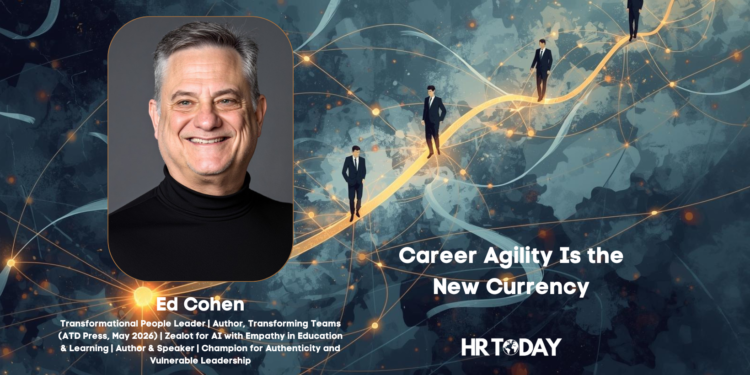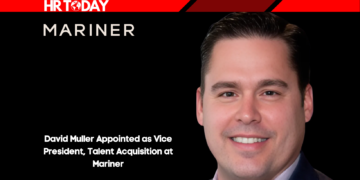Unlocking Potential Through Internal Talent Marketplaces
The biggest risk companies face today is not turnover. It’s talent standing still while the world moves on.

Consider the story of a company called Velocity Global. While the name is fictional, the dynamics are not. This example is drawn from real patterns I have seen repeatedly over 45 years of advising companies across continents—from Silicon Valley to Hyderabad, the United Kingdom to China. The specifics may vary—the need for agility is universal.
The Parable: Velocity Global
Velocity Global was a fast-growing tech and engineering firm with operations in the U.S., India, and across Europe. In its early years, success came from deep specialization—each regional hub focused on its own product lines and local markets. A Bengaluru engineer stayed in engineering. A Paris-based project manager rarely crossed paths with sales. Career growth meant staying in your lane and climbing upward, one rung at a time.
By 2022, things had changed. Client needs spanned continents. Products were launching at breakneck speed. AI integration demanded new skills. And yet, Velocity Global’s workforce was stuck—talented, loyal, capable and siloed.
The turbulence was subtle at first:
- Missed deadlines
- Stalled projects
- Surge in regrettable attrition
Employees were not leaving for money. They were leaving for movement—for challenge, for relevance. The world had shifted, while careers at Velocity had not.
The Rise of Career Agility: Why Adaptability Is More Important Than Tenure
Today, the shelf life of a skill is often shorter than an international assignment. In this landscape, career agility—the ability to adapt roles, stretch skills, and cross boundaries—is more important than loyalty or longevity.
Velocity Global began to see this clearly. In India, a rising product analyst named Priya had deep insights into user data. But her next opportunity required moving into go-to-market strategy—something her role did not allow. In Germany, Luka in operations longed to apply his Six Sigma experience in customer success, but there was no pathway. In California, a leader in R&D struggled to fill urgent needs despite untapped talent just a continent away.
The company was not lacking talent. It was lacking movement.
Internal Talent Marketplaces: The Infrastructure of Agility
That’s when Velocity Global piloted an internal talent marketplace. Not a job board—but a dynamic, AI-enabled system that matched people with stretch assignments, short-term projects, and emerging roles across functions and geographies.

What happened next?
Priya moved into a strategic marketing rotation based in Amsterdam. Luka joined a global task force tackling customer churn. The R&D leader filled her critical role with a Mumbai-based teammate who shadowed, trained, and transitioned in weeks.
Internal mobility does what promotions alone cannot—it unlocks potential already inside the organization.
Internal talent systems are no longer a “nice to have”—they are a strategic imperative. By making opportunities visible and accessible, organizations can transform how they deploy talent, develop people, and drive inclusive growth.
Here’s how internal mobility creates impact at scale:

- Breaks down silos across departments
Internal talent marketplaces increase visibility across teams and functions. This fosters real-time collaboration, dismantles organizational walls, and enables talent to flow where it’s most needed—fueling agility and enterprise thinking. - Empowers employees to grow—without waiting for promotions
Project-based gigs, stretch assignments, and rotational roles give individuals the chance to build new skills and experiences continuously. It shifts the mindset from career ladder to career lattice—fueling growth, engagement, and retention. - Accelerates time-to-fill by tapping internal expertise
With up-to-date insight into internal capabilities and availability, roles and projects can be filled in days—not months. This internal agility reduces hiring costs and builds organizational resilience. - Democratizes access to high-impact roles
Visibility drives equity. By making opportunities open to all—not just those with strong internal networks—organizations create a more inclusive playing field. This levels access for talent across geographies, roles, and backgrounds, helping diverse talent rise.
These shifts mirror leading organizations like Unilever and Schneider Electric, which have leveraged AI-powered gig platforms to support internal mobility at scale (Harvard Business Review, 2021).
The Business Case: Results That Move the Needle
The measurable impact of internal mobility goes far beyond filling roles—it builds a smarter, faster, more resilient organization.

Done right, internal mobility isn’t just a program. It’s a performance multiplier.
- Cost savings: Fewer external hires, smarter investments
Prioritizing internal talent reduces dependency on external recruiting firms, job ads, and lengthy hiring cycles. Savings are redirected into upskilling, development, and retention—yielding higher returns and lowering long-term turnover costs. - Speed: Faster project staffing, real-time deployment
Internal talent can be deployed quickly, without the delays of sourcing, screening, and onboarding. Known, trusted employees step into roles with confidence, helping teams seize opportunities or respond to challenges without lag time. - Retention: People stay where they’re growing
Employees who move internally are more likely to stay and succeed. They see a future, not a ceiling—resulting in deeper engagement and lower attrition across key roles and functions. - Engagement: Career growth becomes visible and real
Internal gigs, lateral moves, and stretch assignments show employees they don’t have to leave to grow. This signals trust, drives motivation, and increases discretionary effort across the board. - Onboarding efficiency: Less ramp-up, more impact
Internal movers already understand the culture, systems, and strategy. They ramp up faster, require fewer resources, and reach full productivity sooner—especially valuable in fast-moving or client-facing environments. - Cultural continuity: Values move with people
Internal talent doesn’t just fill roles—they carry the culture. As employees move across teams or regions, they reinforce shared values and behaviors, building cohesion and resilience from within.
In an environment of constant change, a talent strategy that prioritizes movement over maintenance becomes a competitive edge.
The Human Case: From Ladders to Ecosystems
For decades, career advancement meant climbing a rigid ladder. But the ladder has fractured. Today, meaningful growth often happens laterally or diagonally.
A marketplace enables this shift, unlocking:
- Self-directed development
- Cross-functional learning
- Equitable access to opportunity
It also advances DE&I goals by surfacing overlooked talent and reducing dependence on manager sponsorship. In this ecosystem, people do not wait to be picked. They are visible, matched, and empowered to grow.
Organizational Readiness: Five Steps to Build Career Agility
Internal mobility doesn’t just happen—it’s built. And it starts with a deliberate roadmap.
Here are five foundational steps any organization can adapt to unlock internal career growth at scale:
1. Define a Transparent Skill and Role Architecture
Start with a unified skills taxonomy that spans functions and geographies. Align roles to dynamic capabilities—not outdated job titles. This creates a common language and makes internal movement intuitive, not disruptive.
2. Build and Integrate an Internal Talent Marketplace
Go beyond job postings. Use technology and AI to map internal talent supply and demand. Give employees visibility into stretch assignments, project sprints, and open roles—and empower them to raise their hands. Inclusion must be built into the system design from the start.

3. Train and Incentivize Managers to Support Movement
Career agility stalls when managers hoard talent. Make mobility a leadership expectation. Track it. Recognize leaders who coach, release, and advocate for internal talent—normalizing conversations about what’s next, even if it’s outside their own team.
4. Make Learning Just-in-Time and In-the-Flow
Link the internal marketplace to personalized, on-demand learning. When someone takes a new role, give them curated microlearning, peer support, and mentoring. Reduce the risk of movement by embedding development into the moment.
5. Track Movement, Not Just Metrics
Don’t stop at engagement scores or retention rates. Measure internal moves, skill shifts, time-to-readiness, and the velocity of growth. Use that data to iterate and expand the system—turning internal mobility into a core strategic capability.
Career agility is not a perk—it’s a signal of trust and belief.
When employees are encouraged to move, learn, and grow inside the organization, everyone wins. It’s not disloyalty. It’s how the best cultures are built.
The Future of Talent: A Fluid, Dynamic Network
The most agile organizations no longer operate like static hierarchies. They function as living networks—where skills flow, roles evolve, and people stretch across boundaries.
Here’s what the future-ready talent model looks like:
- People hold multiple roles over time—and sometimes at the same time
- AI tools surface hidden skills, predict future gaps, and suggest next best opportunities
- Career conversations are driven by data, not assumptions or proximity
A designer in Nairobi co-leads a sprint in Amsterdam. A supply chain lead in São Paulo mentors peers in Atlanta. An early-career analyst takes on a global project rotation from Tokyo.
In these organizations, value doesn’t sit in a title or box on a chart.
It lives in the velocity of the people—how fast they grow, connect, and contribute across the system.
The Return to Velocity Global: How It Changed Everything
What began as a pilot transformed the company. Talent moved. Innovation accelerated. Retention improved. And most important: people felt seen, stretched, and supported.
Priya is now a director, mentoring others through the same internal marketplace that unlocked her path. Luka leads customer experience across three regions. And that R&D leader? She built a team as diverse in geography as in skillset—and they outperformed every benchmark set the year before.
The Movement Matters Most
Organizations don’t lose great people to competitors—they lose them to stagnation.
When career growth stalls, so does engagement, innovation, and retention.
Career agility isn’t a perk—it’s a strategic imperative.
Internal talent marketplaces provide the infrastructure. Culture and leadership make it real.
Don’t wait for disruption to force transformation.
Design a workplace where people can grow, contribute, and stretch—without leaving.
In a world that won’t slow down, standing still is the real risk.
Read Also:
Culture, Leadership, Empowerment, Agility and Evolution of HR
Reimagining the Experience Ecosystem













